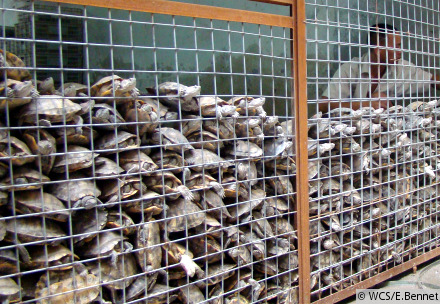On October 20th “In Focus” [焦点访谈], a well-established TV program on China Central Television (public service), has broadcast a report on wildlife trade exposing the neglect of duty of local authorities in charge of preventing illegal wildlife trade in Guangzhou (Guangdong Province).
This report was aired during prime time, both on CCTV 1 and CCTV News channels. It was also re-broadcast to reach an overseas audience during GMT and GMT-6 prime time and on local TV stations the following day (Guangdong TV). An estimated audience of millions of people has learned about the full names and positions of the public officers involved in this scandal, created considerable embarrassment to the local government agencies they work for, which will hardly be without consequences.

Several thousands turtles are traded daily in pets and food markets in Guangzhou, China.
Unprecedented in exposing the alleged connivance of authorities with wildlife traders, this report is likely a spin off of the larger media campaign “Our shared home – We take action protecting wildlife” orchestrated by CCTV in late 2012. That initiative has spurred over 310 public reports resulting in around 41800 animals being rescued, and 7503 markets initiating renovations.
Focus of this reportage is Huadiwan, the biggest pet market in Guangzhou city, which WCS has placed under surveillance since 2008. During the 10 minutes reportage, hidden cameras filmed iguanas, chameleons, and around 40 CITES Appendix I radiated tortoises from Madagascar, with a starting price of 5000RMB (820USD). Sellers reported that because of high demand, sales of these animals have always been very good.
From our intelligence, shared with law enforcement authorities on a monthly basis, we can confirm today's findings. Trade in endangered wildlife trade has been steadily decreasing in this market in the past few years, but is still a major source of revenue for many sellers. Despite law enforcement inspections usually have a short term impact in curbing illegal trade, this media report has proved to be very effective. One week after the reportage has been broadcast we have still found no protected species on sale at any stall.
Several authorities have been interviewed, each of which declared its lack of jurisdiction and referred to another one, escalating from the Huadiwan market management administration to the Industry and Commerce Bureau, then to the Wildlife Conservation Management office, and finally to the Forestry Police Department, which referred back to the market management administration.
This episode shows the new determination of the central Chinese government at recalling local authorities to their duties, and is an evidence of wildlife conservation now being included in the government agenda.
Below is a summary of the reportage in English. The original video (in Chinese) can be watched at http://news.cntv.cn/2013/10/20/VIDE1382270280847850.shtml
The reportage begins with the anchorwoman showing a cute small white dog and explaining that while most people think of cats and dogs, some have a more exotic taste. The Chinese legislation for wildlife conservation is then introduced, explaining the role of CITES and the protection offered by the National Class I and Class II protected species lists.
Following the evidence of several protected species being traded in the market, the journalist highlights how patrolling from the market management staff is indeed very frequent, but ineffective. When asked, the market manager Lee denies being aware of this illegal trade and explains that since he and his staff are not experts, they have limited capacity to identify protected animals. The cameraman then films some vendors selling endangered animals in front of posters clearly depicting the list of protected animals whose sale is prohibited.
“The market administration denies any responsibility, who should be responsible then?” CCTV reporter asks. The higher authority to the market administration is the Industry and Commerce Bureau of Guangzhou city. This also declines any jurisdiction on this matter and refers them to the Forestry Police. The journalist, however, points out that article 35 of China's Wild Animal Protection Law clearly enlists the obligations of this bureau, which they disregarded.
As a next step, the reporter contacts the Wildlife Conservation Guangzhou City Management Office, whose deputy director Li Renyang confirms that his office carries out daily inspections of the city markets, often jointly with the Forestry Police. “Having law enforcement powers, their impact must be huge. Isn't it?” However, answering a specific question, Mr. Li admits that no inspection of the Huadiwan market has been put on records in September. “Is it really so hard to find out what a journalist did manage to?”
Deputy director Li is invited to join the TV crew for an inspection of the Huadiwan market. As he arrives, sellers immediately make sensitive species disappear and some shops are closed altogether. Meanwhile, officers from the Wildlife Conservation Management Office watch passively the sellers getting rid of the compromising evidence. When asked, Mr. Li explains: “It's because the Forestry Police will be here shortly, and these shops also trade some protected species we have no jurisdiction on”.
Eventually – half an hour later – the Forestry Police reaches the location. However, the usually bustling market has now become a desert, showcasing entire rows of empty containers. Asked to comment on the situation, Mr. Xu Zhenyu from the Forestry Police reports that markets are characterized by high mobility, therefore it's hard to guess which shops to actually look for; and adds: “You may want to check with the market management administration how they implement the regulations”. The loop is closed.
The following day, the reporter goes back to the market and records that this has fully resumed its business, with all sorts of wild tortoises, lizards, parrots on massive sale, once again.
The reportage ends with the reporter suggesting the Huadiwan pet market to be renamed into “market of rare and protected animals”, as this is what makes the business rampant over here.